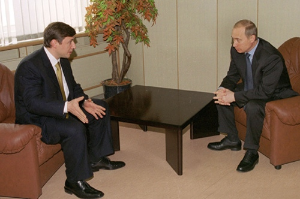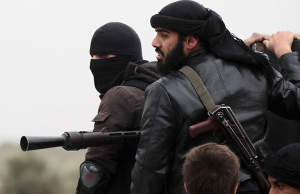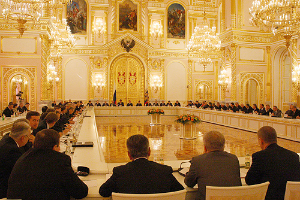SCO-CSTO Merger Raised at Dushanbe Conference
By Oleg Salimov (06/04/2014 issue of the CACI Analyst)
This year, Tajikistan presides over the Shanghai Cooperation Organization (SCO). The center of strategic research under the president of Tajikistan held a conference titled “SCO and the provision of regional security: problems and perspectives” in mid-May, 2014. The conference was devoted to expanding the SCO’s ability to provide regional security, and the merger of SCO and the Collective Security Treaty Organization (CSTO) was a primary topic of discussion.
Aside from issues pertaining to trade and infrastructure, the conference focused on new threats and challenges to regional security and the implications of the U.S./NATO withdrawal from Afghanistan. The SCO’s members presented a declaration containing provisions on increasing the organizations’ security potential, including integrated security measures for all states based on a common interpretation of current realities; a strategy for the SCO’s development and influence in the international arena; the development of regional infrastructure, industry, transportation, and trade; and the expansion of SCO; all aimed to increase the SCO’s political weight in the world.
The most notable statement at the conference was made by the host country’s representative, Khudoberdy Kholiknazarov, who called for a consolidation and merger of SCO and the CSTO, which he presented as being of key importance to regional security and stability.
The statement was a preceded by a meeting of the executive deputies of the Eurasian Economic Union (EAEU), the Commonwealth of Independent States (CIS), the CSTO, and the SCO on April 24, 2014 in the CSTO Moscow headquarter. For the most part, the four organizations unify former Soviet republics and are commonly seen as alternatives to Western international organizations. The attendees of this meeting discussed means for improving coordination and interaction in conditions of growing international confrontation, with reference to the current Ukrainian crisis and regional and global security threats. The CSTO’s Secretary General, Nikolai Borduzha, announced that the CSTO has halted its contacts with NATO as a result of NATO’s position on the crisis in Ukraine, and will instead search for partners in the Asia-Pacific region. In particular, the CSTO will seek closer ties with the SCO and its partners, particularly China and Iran. Hence, the recent SCO conference in Dushanbe became a platform for further probing into the possibility of merging the SCO and CSTO.
The calls for such a merger highlight the growing rift between the West and Russia. The members of these organizations have either expressed their support of Russia’s position on the crisis in Ukraine, like Kazakhstan and Armenia; made ambiguous statements, like China; or refrained from defining their position at all, like Tajikistan and Kyrgyzstan. Some long-term Central Asian leaders, who observed the toppling of Ukraine’s former President Viktor Yanukovych, will welcome the extra security measures that can be employed in case of democratic upheavals after the proposed SCO – CSTO merger. Although the CSTO’s main provision guarantees an embattled member military support from other members in case of external aggression, the 2010 additions to the agreement allow military assistance in cases of militant attacks, illegal armed forces, and other internal conflicts which can include democratic protests.
The expansion and improvement of transportation and communication infrastructure and logistic hubs discussed during the SCO conference are consistent with the needs of the CSTO, which focuses on creating effective military forces that can rapidly be deployed and moved around the region. One of the CSTO’s main declared tasks is the creation of an integrated military system in Central Asia, which will include air defense, intelligence information gathering, railroad protection and supply.
The merger discussions follows on the statement by NATO Deputy Secretary General Alexander Vershbow on May 1, 2014, that Russia is now considered less as a partner and more as an adversary, which in turn came after the CSTO decided to stop its contacts with NATO.
Russia holds leading positions in the SCO and CSTO and could extract substantial economic and political benefits from the merger. Russian influence would be multiplied by the inclusion of China, as a member of SCO, into the CSTO with the imposition of certain obligations which extend beyond political or diplomatic support and require direct military assistance. The widely discussed natural gas deal recently concluded between Russia and China bear the characteristics of leverage in Russia’s attempt to convince China on a SCO–CSTO merger. In part, it explains the rapid conclusion of a gas deal that took 10 years to negotiate.
Russian officials, particularly Gazprom’s CEO Alexei Miller, are unwilling to reveal the conditions or pricing policy of the 30-year gas deal. Even if the effect of the U.S. and EU economic sanctions urged Russia to conclude the agreement, the actual reasoning behind the move was to secure China’s support on the international arena. China has previously expressed support for Russia on Syria, and sought a middle ground between Russia and the West on Ukraine. An SCO-CSTO merger could form the next step in this relationship.
The obvious losers in this development are the people of the Central Asian SCO and CSTO members, whose interests will hardly be considered in the bargaining between Russia and China, and who will become even more dependent on their powerful neighbors. The exit of the U.S. from the regional political arena after the withdrawal from Afghanistan leaves Central Asian countries no other option than to conform to the powers filling up the political vacuum. The SCO conference in Dushanbe potentially marks the start of this process.
While an SCO–CSTO merger could potentially give rise to an extremely powerful international organization and an outright rival of NATO and the EU in the Eastern hemisphere, Russia and China still have a number of conflicting interests that they need to work through, including territorial disputes, rivaling claims to dominance in Central Asia, and Russia’s effort to balance between China and Japan. The intensified appeals for an organizational merger would also require Russia to increase its dependence on China in an attempt to exclude the U.S. and EU from its historical zone of influence. Hence, it remains to be seen whether the SCO–CSTO will move beyond political rhetoric.
Putin Appoints Russian Military General to Rule the North Caucasus
By Valeriy Dzutsev (05/21/2014 issue of the CACI Analyst)
Russia’s President Vladimir Putin is reshaping the administration of the North Caucasus and reshuffling his envoys to the region. The changes reflect Moscow’s frustration with the developments in this unstable territory, the declining financial resources of the central government, and a rebound of imperialist ideology in the Russian Federation. Previous attempts by the Russian government to use economic development as a policy tool to stop the violence and to assert greater control over the North Caucasus largely failed. Moscow’s fears of North Caucasian separatism still play a prominent role in the government’s policies in the region. Having crushed the large-scale insurgency, Russia still faces simmering conflict and has a profound lack of vision for the future of the region.

Russia Fears Jihadists Returning Home
By Dmitry Shlapentokh (05/07/2014 issue of the CACI Analyst)
The Kremlin is facing a new set of terrorism-related challenges in the Middle East and Central Asia and has engaged in several moves to counter these threats. Russia’s policy on Syria can partly be seen in this light – the risk of terrorists acquiring either chemical weapons or the skills to use them could have grave consequences for Russia itself. Accordingly, while continuing to support the Syrian regime, Moscow pressured its Syrian allies to comply in destroying their chemical weapons. Moscow is also increasingly concerned over the aftermath of NATO’s withdrawal from Afghanistan, and over the prospect of both Syria and Afghanistan transforming into training camps for terrorists who could then return to Russia.

Russia's Dilemma in South Ossetia
By Valeriy Dzutsev (04/23/2014 issue of the CACI Analyst)
After a long period of political bargaining between Moscow and the Georgian breakaway territory of South Ossetia, the latter managed to obtain unexpected concessions from Russia. The Russian government’s desire to implement certain policies in the region is successfully obstructed by local politicians. Russian experts are divided on whether Russia should take similar steps in the South Caucasus as in Ukraine. While some argue in favor of quickly moving on with other territorial gains including South Ossetia, others call for a more cautious approach. The Russian government may keep the problem of Georgian breakaway territories as another foreign policy instrument to influence its southern neighbor in case it proceeds to join NATO.






